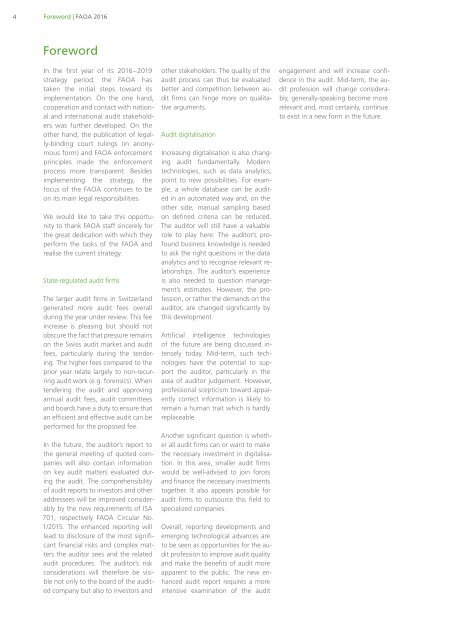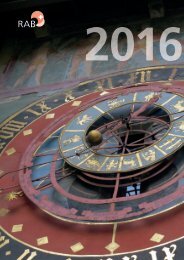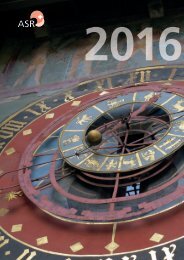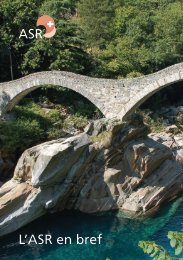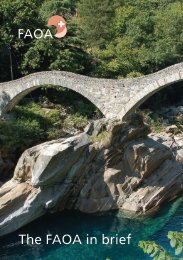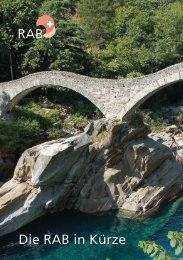Annual Report 2016
Annual Report 2016 - Federal Audit Oversight Authority FAOA
Annual Report 2016 - Federal Audit Oversight Authority FAOA
- No tags were found...
You also want an ePaper? Increase the reach of your titles
YUMPU automatically turns print PDFs into web optimized ePapers that Google loves.
4<br />
Foreword | FAOA <strong>2016</strong><br />
Foreword<br />
In the first year of its <strong>2016</strong>–2019<br />
strategy period, the FAOA has<br />
taken the initial steps toward its<br />
implementation. On the one hand,<br />
cooperation and contact with national<br />
and international audit stakeholders<br />
was further developed. On the<br />
other hand, the publication of legally-binding<br />
court rulings (in anonymous<br />
form) and FAOA enforcement<br />
principles made the enforcement<br />
process more transparent. Besides<br />
implementing the strategy, the<br />
focus of the FAOA continues to be<br />
on its main legal responsibilities.<br />
We would like to take this opportunity<br />
to thank FAOA staff sincerely for<br />
the great dedication with which they<br />
perform the tasks of the FAOA and<br />
realise the current strategy.<br />
State-regulated audit firms<br />
The larger audit firms in Switzerland<br />
generated more audit fees overall<br />
during the year under review. This fee<br />
increase is pleasing but should not<br />
obscure the fact that pressure remains<br />
on the Swiss audit market and audit<br />
fees, particularly during the tendering.<br />
The higher fees compared to the<br />
prior year relate largely to non-recurring<br />
audit work (e.g. forensics). When<br />
tendering the audit and approving<br />
annual audit fees, audit committees<br />
and boards have a duty to ensure that<br />
an efficient and effective audit can be<br />
performed for the proposed fee.<br />
In the future, the auditor’s report to<br />
the general meeting of quoted companies<br />
will also contain information<br />
on key audit matters evaluated during<br />
the audit. The comprehensibility<br />
of audit reports to investors and other<br />
addressees will be improved considerably<br />
by the new requirements of ISA<br />
701, respectively FAOA Circular No.<br />
1/2015. The enhanced reporting will<br />
lead to disclosure of the most significant<br />
financial risks and complex matters<br />
the auditor sees and the related<br />
audit procedures. The auditor’s risk<br />
considerations will therefore be visible<br />
not only to the board of the audited<br />
company but also to investors and<br />
other stakeholders. The quality of the<br />
audit process can thus be evaluated<br />
better and competition between audit<br />
firms can hinge more on qualitative<br />
arguments.<br />
Audit digitalisation<br />
Increasing digitalisation is also changing<br />
audit fundamentally. Modern<br />
technologies, such as data analytics,<br />
point to new possibilities. For example,<br />
a whole database can be audited<br />
in an automated way and, on the<br />
other side, manual sampling based<br />
on defined criteria can be reduced.<br />
The auditor will still have a valuable<br />
role to play here: The auditor’s profound<br />
business knowledge is needed<br />
to ask the right questions in the data<br />
analytics and to recognise relevant relationships.<br />
The auditor’s experience<br />
is also needed to question management’s<br />
estimates. However, the profession,<br />
or rather the demands on the<br />
auditor, are changed significantly by<br />
this development.<br />
Artificial intelligence technologies<br />
of the future are being discussed intensely<br />
today. Mid-term, such technologies<br />
have the potential to support<br />
the auditor, particularly in the<br />
area of auditor judgement. However,<br />
professional scepticism toward apparently<br />
correct information is likely to<br />
remain a human trait which is hardly<br />
replaceable.<br />
Another significant question is whether<br />
all audit firms can or want to make<br />
the necessary investment in digitalisation.<br />
In this area, smaller audit firms<br />
would be well-advised to join forces<br />
and finance the necessary investments<br />
together. It also appears possible for<br />
audit firms to outsource this field to<br />
specialized companies.<br />
Overall, reporting developments and<br />
emerging technological advances are<br />
to be seen as opportunities for the audit<br />
profession to improve audit quality<br />
and make the benefits of audit more<br />
apparent to the public. The new enhanced<br />
audit report requires a more<br />
intensive examination of the audit<br />
engagement and will increase confidence<br />
in the audit. Mid-term, the audit<br />
profession will change considerably,<br />
generally-speaking become more<br />
relevant and, most certainly, continue<br />
to exist in a new form in the future.


